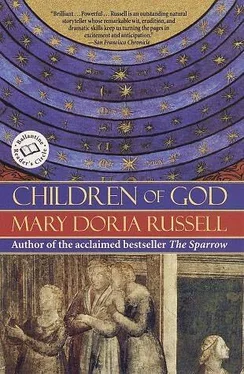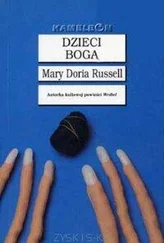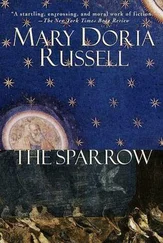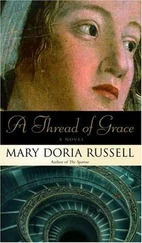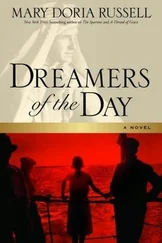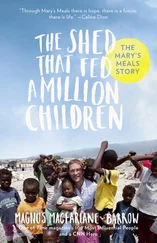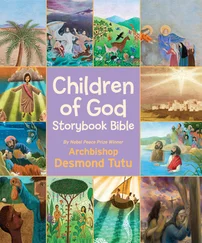"Several weeks later, Askama had located Sandoz herself, and took the ranking members of the Magellan party to him. He was found in Hlavin Kitheri’s seraglio, naked except for a jeweled collar and perfumed ribbons, the bloody effects of sodomy visible. By his own admission, Sandoz had by that time reached a state of murderous desperation. Hoping to prove himself so dangerous that he would either be left alone or executed, he had that day made Jephthah’s vow: that he would kill the next person he saw. He could not have anticipated that it would be Askama, a Runa child whom he had all but raised, and whom he loved deeply.
"When Sandoz looked up from Askama’s corpse and saw the Consortium officials, he laughed. I think it was his laughter that convinced them of his depravity, and of course they had Supaari VaGayjur’s later assurances that Sandoz had prostituted himself at his own request. I now believe that his laughter was evidence of hysteria and despair, but they had just witnessed a murder, and under the circumstances, the Magellan party was inclined to believe the worst."
As was I, Vincenzo Giuliani thought, standing once more and walking away from his desk.
It was absurd in hindsight—the very idea that a handful of humans might have been able to do everything right the first time. Even the closest of friends can misunderstand one another, he reminded himself. First contact—by definition—takes place in a state of radical ignorance, where nothing is known about the ecology, biology, languages, culture and economy of the Other. On Rakhat, that ignorance proved catastrophic.
You couldn’t have known, Vincenzo Giuliani thought, hearing his own pacing, but remembering Emilio’s. It wasn’t your fault.
Tell that to the dead, Emilio would have answered.
2
Trucha Sai, Rakhat
2042, Earth-Relative
SOFIA MENDES HAD KNOWN FROM THE VERY START THAT THE MEMBERS of the Jesuit mission to Rakhat would be an endangered species on that planet.
The Stella Maris had begun with a crew of eight. Alan Pace died within weeks of landfall, and then they were seven. D. W. Yarbrough, the Jesuit superior, became ill a few months later and never recovered, although he survived an additional eighteen months, in declining health. Understandably, having no research facilities and no colleagues, the physician Anne Edwards was never able to understand either illness, although her care undoubtedly prolonged D.W.’s life. Later, Anne herself was killed, along with D.W., and their deaths were a staggering blow to the tiny band they left behind.
In the face of misfortune, the Jesuit party had rallied repeatedly. When a simple miscalculation in the aftermath of a serious accident resulted in the crew being marooned on Rakhat, they had adapted, establishing a garden to supply themselves with food, becoming part of the local economy by providing exotic trade goods. They were accepted by the villagers of Kashan, even to the point of being called by kinship terms by many families. And there were times of great joy, most notably Sofia’s own wedding to Jimmy Quinn, and the announcement that they were awaiting a birth—just before it all went wrong.
Like so many Jewish children, Sofia Mendes had grown up with nightmare images of Egyptian slavemasters, of Babylonians and Assyrians and Romans, of Cossacks and inquisitors, and the SS coming to kill; she had vanquished a child’s intense, impotent fear by imagining herself fighting back, repulsing would-be conquerors. So when the Jana’ata patrol had arrived at Kashan and burned the foreign garden and demanded that the VaKashani Runa bring their babies forward and then, systematically, began to kill the children, Sofia Mendes had acted without hesitation. "We are many. They are few," she called out to the VaKashani and lifted a Runa infant to breasts swollen with her own pregnancy.
"We," she said, and cast her fate with the Runa—with the untermenschen of Rakhat.
Her gesture, briefly, turned the tide; her own fall, under the bludgeoning sweep of a Jana’ata arm, stiffened the resistance. Then, believing that they could not win, Runa fathers fell over children to shield them with their bodies; Runa mothers sacrificed themselves to Jana’ata fury, absorbing the violence to save the rest. When it was over, there were scores of carcasses, heaped and bloody, most of which were quickly butchered.
When the patrol left, terror and the unprecedented exhilaration of momentary triumph made consensus impossible. The village of Kashan had fissioned, in violation of the most basic Runa strategies for survival: stay together; circle to protect the greatest number; act in concert. Close to panic, individuals searched for anyone who shared some identifiable emotion, forming small, less vulnerable clusters as quickly as possible. Those whose families had been killed added sinuous scented ribbons to their arms and necks, too stunned to react. Most did little more than hope life would return to normal, now that all the foreigners except Sofia were gone and most of the illegal babies dead. Their impulse was to hand Sofia over to the Jana’ata government as proof that Kashan was once again within the law. "Spend one, buy many," they cried.
"But Fia didn’t harm us! The djanada did this!" a girl named Djalao countered. Barely grown, she had no authority, but in the confusion, there were those so hungry for direction that they listened. "Warn as many other villages as possible. Tell them what happened in Kashan," Djalao told the runners in the aftermath of the massacre. "The djanada patrols are coming, but tell the people what Fia said: We are many. They are few."
Kanchay VaKashan was as confused as anyone, but it was his daughter Puska whom Sofia had saved, and he was grateful. So when a handful of men with surviving infants decided to wait until redlight and flee to the safety of the southern forest, he took Sofia as well.
Of their journey to sanctuary, Sofia herself remembered only the occasional thin keening of Runa infants; the swaying, fluid stride of Kanchay, who carried her on his back for days; the sounds of savannah changing to forest. At first, her face hurt so much she could not open her mouth, so Kanchay reduced food to a paste for her and mixed it with rainwater, drizzling this gruel through her clenched teeth. She took as much nourishment as she could that way. The child, she thought. The child needs it. Bled white, stupid with pain, she concentrated on her own baby, who was not yet lost to her like all the other people she had dared to love. She focused her life’s blood on her center, where the child still lived, and felt each vague fetal movement as fear, each strong kick as hope.
She slept heavily in the beginning and even later dozed a great deal, warmed by three suns’ light filtering through the forest canopy. When awake, she lay still, listening to the rhythmic, rasping slide of long, tough leaves the shape of samurai swords—bent and woven, bent and woven— as the Runa settled into a clearing made efficiently beautiful with sleeping platforms and windscreens. Nearby she heard the splash of creek water tumbling over smooth stones. Above, the booming groans of w’ralia trunks bending in the breeze. Everywhere, the soft, swooping vowels of Ruanja, the constant hum of Runa fathers loving babies who had not been meant to live.
When she was stronger, she asked where she was. "Trucha Sai," she was told. Forget Us. "The Runa come to Trucha Sai when the djanada smell too much blood," Kanchay explained, speaking simply as though to a child. "After a while, they forget. We-and-you-also will wait in the forest until then."
It was more than an explanation, she understood. Kanchay had chosen his words with intent. "There are two forms of first person plural," Emilio Sandoz had once told the other members of the Stella Maris party. "One is exclusive of the person addressed, yes? It means we-but-not-you. The other is we-and-you-also. If a Runao uses the inclusive we, you may be sure it is significant and you may rejoice in a friendship."
Читать дальше
